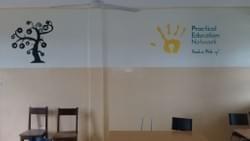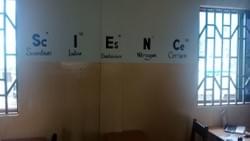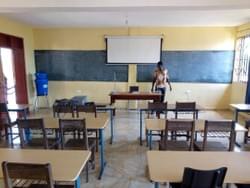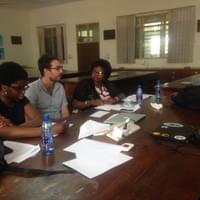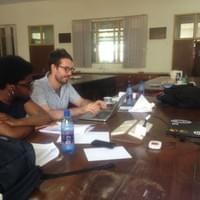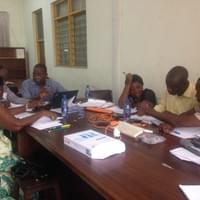
Teacher Training Workshops

Ashesi Education Collaborative
Ashesi Education Collaborative Collaborates with other institutions to advance higher education in Africa
Ashesi Education Collaborative seeks to build a network of exemplar institutions that share meaningful insight, stimulate engagement around relevant content, and empower individuals and groups in Africa to transform themselves, their surroundings and ultimately, the continent.
Ashesi University has led the way amongst African universities in its rapid response to shifting teaching and learning to online platforms. They have partnered with Practical Education Network to extend Ashesi's framework of transitioning learning to digital platforms by converting PEN’s teacher training to online modules for basic school STEM teachers. Through this partnership, teachers will be equipped with digital access to national curriculum-aligned, instructional content. They will also be equipped with requisite skills to continue deploying practical science content to students while schools are closed. Most importantly, through this partnership, each participant will be empowered (financially) to train at least one more teacher and this trickles down till a total of 100 teachers are trained. This cascading model will ensure sustained training for STEM teachers

ExxonMobil
ExxonMobil's primary responsibility is to produce the energy and products the world needs in a responsible manner.
ExxonMobil uses technology and innovation to help meet the world’s growing energy needs.
ExxonMobil is committed to inspiring and preparing students to pursue STEM careers. They encourage the pursuit of math and science through a variety of programs. By making a joint effort with other leaders and organizations, they put science and math fluency on the fast track.
ExxonMobil partnered with Practical Education Network to train 100 teachers in a two-year PEN Teacher Roadmap programme, an incentive programme designed to engage, encourage and reward STEM teachers along with a two-year plan, taking them from ground level into competent and innovative teachers while equipping them with entrepreneurial skills, abilities, and opportunities.
They are also assisting in the printing and distribution of 2000 Practical Education Network Science manuals which will be used in equipping teachers to effectively implement the new Science curriculum.
Someone Else’s Child is a 501(c)3 non-profit corporation that supports children’s causes throughout the U.S. and in Africa.
Someone Else’s Child Foundation works to help underserved children and teens in need by sponsoring programs and initiatives to support and enhance their lives.
The outbreak of the Coronavirus (COVID-19) pandemic has necessitated the move to online learning platforms and as a result, we have translated our in-person teacher-training program into digital modules to enable teachers to maximise our hands-on learning curriculum. Someone Else's Child Foundation has partnered with PEN to train a total of 100 basic school STEM teachers from the Greater Accra region via our online training which also incorporates key digital literacy skills and public health education on COVID-19.
Isaac Kwaku Fokuo, Jr.
Founder and Principal of Botho Emerging Markets Group an investment and strategy advisory firm.
Isaac is an angel investor to start-ups based in Africa and the Middle East, and co-founder of the Amahoro Coalition, an initiative convening private sector firms in Africa to accelerate the economic inclusion of refugees.
Isaac sponsored the training of sixteen teachers from the Kumasi Presby schools in the Ashanti region of Ghana. The training seeks to engage, encourage, and equip teachers over a three-month plan, taking them from ground level into innovative hands-on STEM teachers. They will be exposed to the art and science of using local materials to facilitate hands-on learning and will be assisted to create their own teaching and learning toolbox, to deliver well and master the craft of engaging, teaching and supervising their students remotely.

No. 15 Afari Gyan Street, North Legon, Accra, Ghana.
info@practicaleducationnetwork.com
Contact Us
0303943580
Practical Education Network © 2023















